Gradle with GitHub Packages - Host Rule Implementation
This article details the instructions to successfully configure our repo integrations with your Gradle private registries that are hosted in GitHub Packages. Gradle private registries can be accessed by authentication via a token. This will allow our repo integrations to scan your private Gradle packages for vulnerabilities and compliance.
Note: For information on how to publish a Gradle package to GitHub Packages, please see GitHub’s documentation.
Generating a Personal Access Token (PAT) in GitHub for your GitHub Packages
For general information on Personal Access Tokens (PATs) and their permissions within GitHub packages, please see GitHub’s documentation: https://docs.github.com/en/packages/learn-github-packages/about-permissions-for-github-packages#about-scopes-and-permissions-for-package-registries.
To create a PAT to be used for resolving private Gradle packages hosted in GitHub Packages, please follow the instructions below:
Note: The account where this PAT is generated must have access to the GitHub repository where the GitHub Packages are hosted.
Within your GitHub account, navigate to Settings:
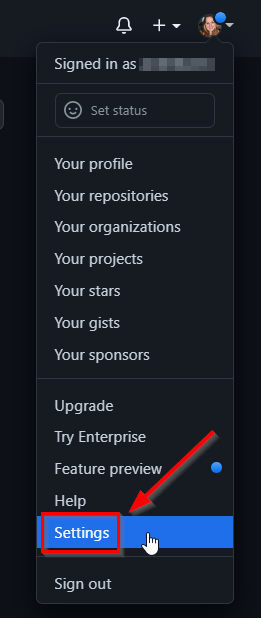
On your Settings page, scroll down the left-side table of contents and select Developer settings:
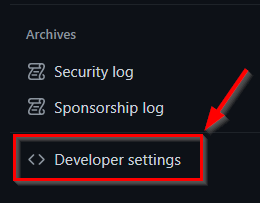
Select Personal access tokens > Tokens (classic):
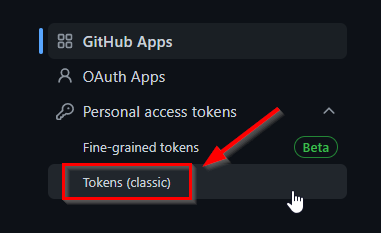
Click on Generate new token > select Generate new token (classic):
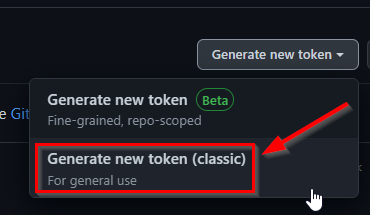
Fill in the settings as seen here:
Note: Can be any value. We recommend naming it something that will help you remember what the PAT is for:

Expiration: The expiration date of the PAT. We recommend using whatever value works best for your organization. Keep in mind that, if you do place an expiration date on the PAT, our hostRules settings must be updated when it expires. In our example, we will use the No expiration option:

Select scopes: The read:packages scope must be enabled to resolve GitHub Packages through our hostRules configuration:
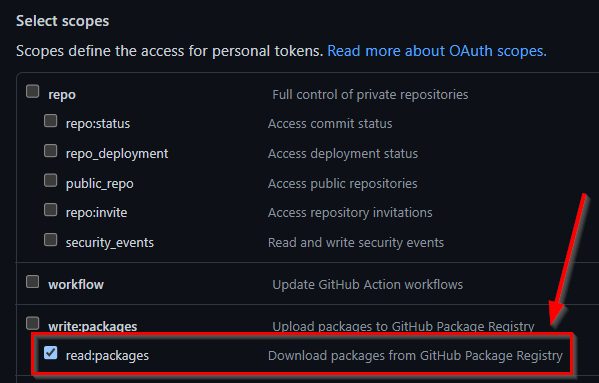
Scroll to the bottom and click on Generate token:

Copy the PAT value provided and save it for the next section, Encrypting the GitHub PAT
Encrypting the GitHub PAT
For Mend-Hosted repo integrations (GitHub.com, Bitbucket Cloud, and Azure Repos)
Navigate to our Mend's Repository Integration Secrets Encryption page
Each secret you encrypt must be scoped to a GitHub org, Bitbucket Cloud Workspace, or Azure project, and its use will be restricted to those within the app. There are the following fields on the encryption page:
Organization\Group - required; your GitHub org, Bitbucket Cloud Workspace, or your Azure project to which secrets are to be scoped
Repository - optional; your repository to which secrets are to be scoped
Raw value - required; your GitHub PAT that was created prior
Click on Encrypt. This will create an encrypted value, which is the result of the encryption to be used in the integration
Copy this encrypted value
For Self-Hosted repo integrations (GitHub Enterprise, Bitbucket Server and Data Center, and GitLab)
Follow the steps outlined below to generate encryption for each of the Self-Hosted repo integrations:
Mend for GitHub Enterprise | Handling Private Registries and Authenticated Repositories
Installing Mend for GitLab | Handling Private Registries and Authenticated Repositories
When generating a secret, there are the following fields on the encryption page:
Organization\Group - required; your GitHub org, GitLab group, or Bitbucket group to which secrets are to be scoped
Repository - optional; your repository to which secrets are to be scoped
Raw value - required; your GitHub PAT that was created prior
Click on Encrypt. This will create an encrypted value, which is the result of the encryption to be used in the integration
Copy this encrypted value
Where can I find the matchHost URL for Gradle?
The URL that is to be used for the matchHost setting in the hostRules can be found in the build.gradle file > publishing.repositories.maven.url parameter when your Gradle package was published. For example:
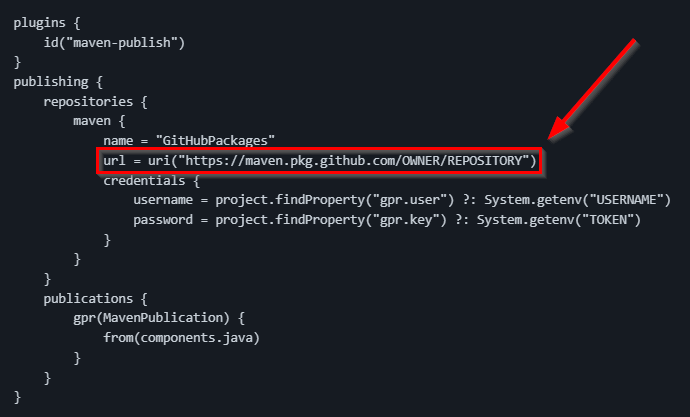
OWNER- ReplaceOWNERwith the name of the GitHub user or organization account that owns the repository where your Gradle GitHub Packages are hostedREPOSITORY- ReplaceREPOSITORYwith the GitHub Repository where your Gradle GitHub Packages are hosted
Note: If you have multiple GitHub repositories for your Gradle packages, you will need to complete these steps and create a hostRule for each url that is being used.
Applying the hostRules
Within your repo-config.json (if you have a global setup) or, in your .whitesource file (if you are configuring at the repo level), include the following required hostRules settings:
matchHost - The URL of the GitHub repository where your Gradle packages are located. NOTE: You should have one rule for each GitHub repository where your Gradle packages are located - meaning there can be multiple hostRules
hostType -
mavenuserName - The GitHub user or organization account that owns the repository where your Gradle GitHub Packages are hosted
token - The encrypted value that was generated
hostRules Example
{
"hostRules": [
{
"matchHost": "https://maven.pkg.github.com/OWNER/REPOSITORY",
"hostType": "maven",
"userName": "hostrules",
"encrypted": {
"token": "3f832f2983yf89hsd98ahadsjfasdfjaslf............"
}
}
]
}